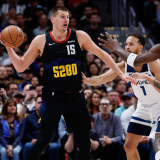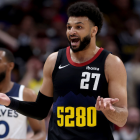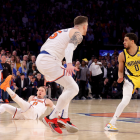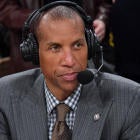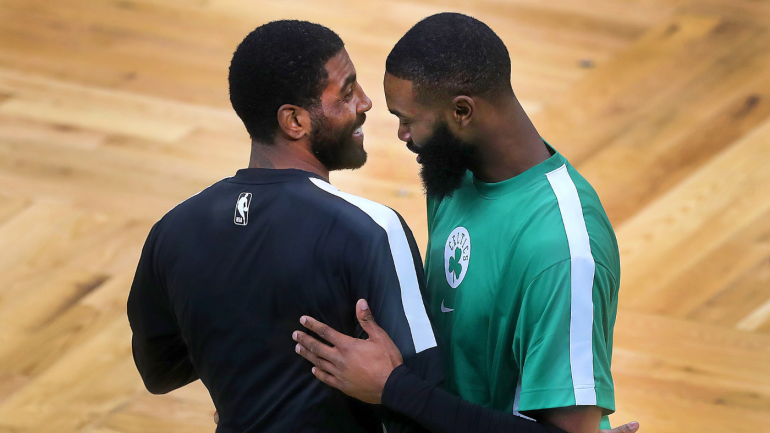
It was almost five months ago that Kyrie Irving, then a member of the Brooklyn Nets, was suspended for what turned out to be eight games for what the Nets deemed a "failure to disavow antisemitism" and ultimately conduct detrimental to the team.
For most people, the reasons for suspending Irving were obvious at the time and remain justified even with the benefit of hindsight. Boston Celtics All-Star Jaylen Brown, Irving's former teammate who serves as vice president of the NBPA, is not one of those people.
From Logan Murdock of The Ringer:
Brown tells me that he still believes that Irving's punishment was unjust, not because he agrees with the content of the film, but because the suspension violated the collective bargaining agreement.
"That's my job as vice president of the union," Brown says. "The union is supposed to be an entity to protect the players, especially their rights and their freedom of speech. I feel like what the Brooklyn Nets did—I still feel the same way—it was inappropriate. I think it was like a public ransom note almost, in a sense, where he had a list of demands he had to do to return to the game. It was a violation of our CBA. It's a violation of our agreement and kind of got looked over like it was nothing."
The list of demands to which Brown is referring were the six requirements (listed below), issued by the Nets, that Irving had to satisfy before he would be allowed to return to the team.
- Apologize and condemn the film he promoted
- Make a $500,000 donation to anti-hate causes
- Complete sensitivity training
- Complete antisemitism training
- Meet with the ADL and Jewish leaders
- Meet with team owner Joe Tsai to demonstrate an understanding of the situation
Brown likening this to a "ransom note" is a wild stretch, but I suppose that's a matter of opinion. Brown's assertion that the Nets' suspension of Irving in the first place was a violation of the league's CBA, however, is one that can be tracked directly against the CBA language, which you will find cited below. In doing so, it wouldn't appear that Brown's claim holds water.
(b) The Player agrees: (i) to give his best services, as well as his loyalty, to the Team, and to play basketball only for the Team and its assignees; (ii) to be neatly and fully attired in public; (iii) to conduct himself on and off the court according to the highest standards of honesty, citizenship, and sportsmanship; and (iv) not to do anything that is materially detrimental or materially prejudicial to the best interests of the Team or the League.
(c) For any violation of Team rules, any breach of any provision of this Contract, or for any conduct impairing the faithful and thorough discharge of the duties incumbent upon the Player, the Team may reasonably impose fines and/or suspensions on the Player in accordance with the terms of the CBA.
This is pretty clear that a team is within its rights to suspend and/or fine a player for doing "anything that is materially detrimental or materially prejudicial to the best interests of the Team or the League."
So this becomes a question of whether Irving's conduct could be reasonably deemed detrimental. It has nothing to do with Irving's freedom of speech, as Brown claims. Freedom of speech does not equate to impunity.
Irving's suspension, as you'll likely recall, stemmed from his social-media promotion of a film that was widely described as featuring antisemitic tropes, and which Irving later admitted "contained some false antisemitic statements, narratives, and language that were untrue and offensive to the Jewish Race/Religion, and I take full accountability and responsibly for my actions."
The problem, as the Nets saw it, was that Irving's admission came as part of an apology, which was posted to his Instagram account, that should've come sooner. About four hours before the apology post, Irving was given ample opportunity to apologize and/or denounce antisemitism in a post-practice media session, but he refused to do so.
"We were dismayed today, when given an opportunity in a media session, that Kyrie refused to unequivocally say he has no antisemitic beliefs, nor acknowledge specific hateful material in the film. This was not the first time he had the opportunity -- but failed -- to clarify," the Nets said in a statement at the time.
"Such failure to disavow antisemitism when given a clear opportunity to do so is deeply disturbing, is against the values of our organization, and constitutes conduct detrimental to the team," the statement continued. "Accordingly, we are of the view that [Irving] is currently unfit to be associated with the Brooklyn Nets."
One could easily argue that Irving promoting an antisemitic film on its own would qualify as detrimental conduct, let alone his defensive behavior and outright refusal to simply say "no" when asked explicitly whether he has antisemitic beliefs during the aforementioned media session that ultimately led to his suspension.
Perhaps that's why the NBPA has not taken any legal action against Irving's suspension. Or perhaps there is a plan to eventually do so. For now, all we know is that Brown doesn't agree with the way it happened, and though he has been clear that he doesn't agree with the content of the film that Irving promoted, he isn't shy about supporting his former teammate.








